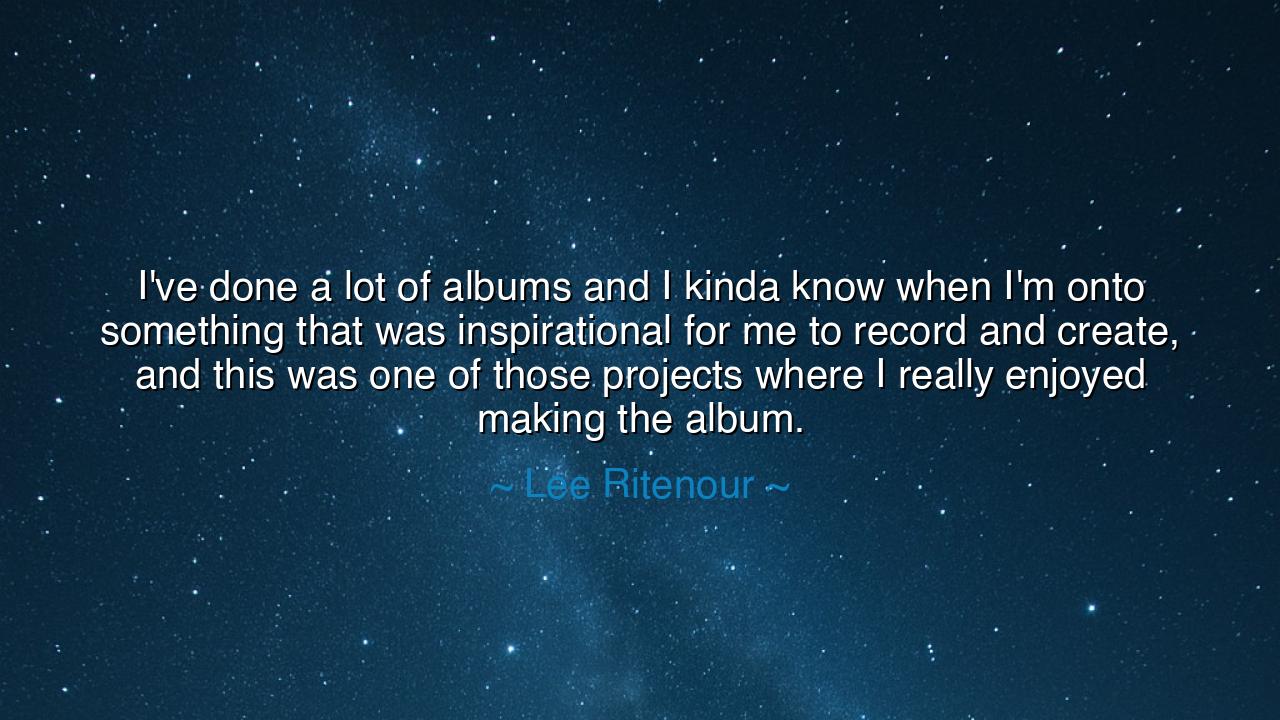
I've done a lot of albums and I kinda know when I'm onto
I've done a lot of albums and I kinda know when I'm onto something that was inspirational for me to record and create, and this was one of those projects where I really enjoyed making the album.






In the words of Lee Ritenour, the master guitarist whose melodies have graced the world with both grace and groove, we find the quiet revelation of a true craftsman: “I’ve done a lot of albums, and I kinda know when I’m onto something that was inspirational for me to record and create, and this was one of those projects where I really enjoyed making the album.” Within these humble words lies a timeless truth about the nature of art, joy, and the sacred act of creation. It is the voice of one who has walked long upon the road of mastery and who has learned that true greatness comes not from ambition, but from love — love for the work itself.
Ritenour speaks not as a beginner discovering the thrill of sound, but as a seasoned soul who has given decades to his craft. And yet, he still speaks of inspiration, as though each new project were a rediscovery of wonder. This is the mark of the true artist — that no matter how many times he creates, the act never grows old. Like the sunrise, familiar yet forever new, inspiration revisits those who remain humble before its mystery. His words remind us that mastery is not the end of learning; it is the beginning of awareness — the ability to sense when something greater than oneself has entered the room, whispering, “This one matters.”
To say that an album is inspirational “to record and create” is to acknowledge the sacred dance between the artist and the unseen. The ancients would call it the muse — that divine presence that touches mortal hands and fills them with music, color, or word. For even the most skilled musician cannot summon inspiration by will alone; it comes when the heart is open and the soul is ready. Ritenour, through experience, has learned to recognize its arrival — that subtle, electric stillness that tells him he is standing in the presence of something alive.
Consider the story of Michelangelo, who once said that every block of marble contained a hidden figure, and it was his task only to set it free. He could tell, by instinct and reverence, when a stone held a soul within it. So it is with Ritenour and his music: he knows when a project is just another work, and when it is the one that sings back to him. That sense of spiritual recognition — that knowing — is not born of intellect but of intimacy. It is what happens when the creator and the creation merge, and joy becomes the measure of success.
When Ritenour says, “I really enjoyed making the album,” he reminds us that joy is not a byproduct of creation — it is its purpose. Too often, we are taught that greatness comes through struggle, through relentless striving. But joy is the true compass of inspired work. It is the sign that the soul is aligned with its calling. The ancients who built temples or composed hymns knew this: they did not labor only for perfection, but for connection — to the divine, to beauty, to meaning. In joy, the spirit finds its home.
And yet, Ritenour’s words also teach patience. He says, “I kinda know when I’m onto something,” implying that inspiration cannot be forced or faked. It must be felt. There are seasons when the well runs dry, when the music will not come — but these too are part of the journey. For when inspiration finally returns, it floods the heart like spring after winter. The artist who endures the silence earns the song. Thus, Ritenour’s wisdom lies not only in the making of music, but in the listening — the quiet faith that creation will reveal its rhythm when the time is right.
So, dear listener, take this lesson as a torch for your own path. Whatever your craft may be — whether you build, write, teach, or dream — learn to recognize the moment when the work begins to breathe on its own. Follow joy as your guide; it is the surest sign that your spirit is in harmony with your purpose. Do not chase success; chase aliveness. When you feel that spark — that sense of inspiration that makes hours vanish like moments — honor it. That is the voice of creation calling you to greatness.
And when the work is done, look back not with pride, but with gratitude — for like Lee Ritenour, you will know that you were touched by something larger than yourself, that you did not simply make something — it made you. And in that sacred exchange, the world is changed, note by note, heart by heart, forever.






AAdministratorAdministrator
Welcome, honored guests. Please leave a comment, we will respond soon